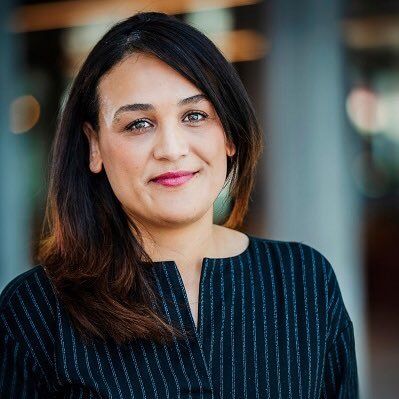Shattering the glass ceiling: the European elections and the push for gender parity
#CriticalThinking
Member of the Dutch Appeal Advisory Committee on Childcare Allowance and 2014 European Young Leader (EYL40)

Co-Founder & Executive Director of Republican Women for Progress and 2017 North American Young Leader
The European elections are fast approaching. From 23-26 May, millions of Europeans will have the opportunity to cast their ballot for a new European Parliament (EP) and, in turn, a new European Commission. Among the many developments that have contributed to the reconfiguration of global politics in the five years since the last elections took place, the United Kingdom’s decision to leave the EU and Trump’s victory in the 2016 US presidential elections are the most glaring.
It comes as no surprise that not everyone in the United States is happy with the current administration. However, President Trump has, albeit unintentionally, helped foster a new wave of activism and political engagement in the US and abroad, as demonstrated by the countless marches that have been organised throughout the country and the substantial number of women and young people who announced their decision to run for office during the 2018 midterms. They ran and they won, resulting in what is now being called the ‘rainbow wave’. Diversity triumphed, and we hope it will again in the 2019 EP elections.
Aside from knowing what the EP’s agenda is for the next mandate, it is just as important to look at who will take a seat in the Parliament. Why? Because representation matters, that’s why. This year, it will be 100 years since women won the vote in several European countries. But much remains to be done; data shows that women continue to be under-represented in politics, on a local, national and European level.
In the first directly elected European Parliament in 1979, 16.6% of elected members were women. Ever since, with every new election, the percentage of women has grown significantly, with this number reaching 35.8% following the 2014 elections. This is above the EU average for national parliaments, which currently stands at a mere 30.2%. However, there are large differences between member states, from those with a high percentage of women, such as Finland (76.9%), to countries like Estonia and Cyprus (both 16.7%). The composition of the European Commission has yet to achieve gender parity, too. Only 9 of the current 28 Commissioners are women.
To the political parties, we say: make electing women a priority
How can this be changed? How can we increase not only the number of women in Parliament, but also the number of women running in the next election? How can Europe get its own rainbow wave?
Compare what’s happening in Europe with what has been happening in the US. In 2016, Hillary Clinton became the first female nominee of a major political party. Despite ultimately losing in the presidential election, her nomination shattered the first layer of the glass ceiling, inspiring women and minorities alike to step up and get involved in politics at levels never before seen.
Fast forward to the 2018 midterm elections and the results of the first US rainbow wave of its kind are becoming more and more apparent. 117 women were elected to Congress, bringing the total number of women in Congress to 127, the largest cohort of females on Capitol Hill in the country’s history. Of those 117 women, 36 were new members, and 20 of those elected to the House of Representatives were first time candidates. Even better, 23 of new members in the House of Representatives were minorities, making this the most diverse Congress ever.
A number of different factors were at play, helping to foster this wave of diversity, but if we the people can consciously take steps to ensure that these trends continue, we can rest assured that the likes of Donald Trump and friends will cease to enjoy the power that they do today.
To the political parties, we say: make electing women a priority. In the US, we’ve seen the impact that just one elected woman can have on the legislative agenda (consider moderate Republicans like Susan Collins or Lisa Murkowski, who have singlehandedly been able to stop Far Right bills from getting through). Parties must think about female candidates, not just at the national or European level, but at the local level, too, where important policymaking is also carried out. These are the women that will run for higher office one day.
You don’t have to be a member of a political party to make your voice heard
Parties must also be prepared to train women to run. Without the proper recruiting, fundraising and training infrastructure in place, the candidates will continue to go the way of the old, established, white men.
To the men, we say: make room for the rainbow wave to happen. Support the rainbow wave. Instead of viewing women as a threat, see them as partners with whom you can collaborate to forward your policy agenda. To do so, you need to make sure that women have a seat at the decision-making table. If they comprise half of the number of voters and constituents, they can certainly help shape platforms and ideas to suit the people.
To the women, we say: get involved! The late Els Borst, former minister and first female party leader of the Dutch liberal democrats, D66, had this to say: “politics is too important to be left to men alone”. You don’t have to be a member of a political party to make your voice heard. If you’re passionate and knowledgeable about something, make it known. Brand yourself as an expert in your field. And make sisterhood a priority in your life. If you’re not running, support the women who are running. If you’re not marching, support the women who are marching.
In the Netflix film, Break Down The House, we see candidate Alexandria Ocasio-Cortez (now US Congresswoman AOC) respond to another female candidate during the midterms campaign with the following statement: “For one of us to make it through, a hundred of us have to try”. In 2019, one can only say that that is a sad reality. Support the 100 who get out here and try to break down the Brussels Bubble.
Stay informed
